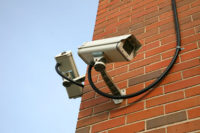Police are allowed, in some circumstances, to install hidden surveillance cameras on private property without obtaining a search warrant, a federal judge decided on October 29.
According to reports from CNET, U.S. District Judge William Griesbach ruled that he was reasonable for Drug Enforcement Administration agents to enter rural property without permission and without a warrant to install multiple “covert digital surveillance cameras” in hope of uncovering evidence that 30 to 40 marijuana plants were being grown.
CNET also reports that this case highlights how technological advances are causing the legal system to rethink how Americans’ privacy rights are protected by law. In January, the Supreme Court rejected warrantless GPS tracking after previously rejecting warrantless thermal imaging, but it has not yet ruled on warrantless cell phone tracking or use of surveillance cameras placed on private property with neither permission nor warrant.
Griesbach adopted a recommendation from U.S. Magistrate Judge William Callahan, which ways that the DEA’s warrantless surveillance did not violate the Fourth Amendment, which prohibits unreasonable searches and requires warrants to describe the place being searched, CNET reports.
Callahan wrote that “The Supreme Court has upheld the use of technology as a substitute for ordinary police surveillance.”
The two defendants – Manual Mendoza and Marco Magana of Green Bay, Wis. – have been charged with federal drug crimes and face possible life imprisonment and fines up to $10 million. They asked Callahan to throw out the video evidence on Fourth Amendment grounds, noting that “No Trespassing” signs were posted throughout the heavily wooded, 22-acre property, which also had a locked gate. However, CNET reports, Callahan based his recommendation on precedents that said that “open fields” could be searched without warrants because they aren’t covered by the Fourth Amendment.



